Here's the untold story of the Stone Pony, celebrating its 50th anniversary in 2024
- Oops!Something went wrong.Please try again later.
The Stone Pony was built to last.
The venerable yet humble Asbury Park nightclub and music venue has survived several owners, multiple closings, Superstorm Sandy, COVID-19 and the vicissitudes of the music industry over the last 50 years.
The Pony, which has hosted the greats of music, is known all over the world. Bruce Springsteen, who is closely associated with the club, did not get his start there — but he certainly left his indelible mark.
“It put us on the map,” said fan Erin Ober, 26, of Colts Neck. “If you know Jersey, you know the Stone Pony.”
More: I've spent 1,000 nights at the Stone Pony, and found a community of music lovers
It's going to be a big year for the club, which opened Feb. 8, 1974. The 50th anniversary celebration kicks off Thursday, Feb. 8, as Asbury Park has proclaimed it "Stone Pony Day" in the city. Deejay Lee Mrowicki will spin the hits at the club, and the Pony faithful will reminisce. After that, Southside Johnny and the Asbury Jukes, who got their start at the Pony in 1974, will play two anniversary shows, Feb. 16 and 17.
Elvis Costello, the Pretenders, Green Day, Panic! at the Disco and Wyclef Jean have taken the stage at the Pony. So have plenty of up-and-coming acts.
“For a lot of these bands, it’s their dream to play on that stage,” said house photographer Jeff Crespi. “(They say), ‘Oh my god, we’re getting to play the legendary Stone Pony.’ ”
More: The Stone Pony’s fame is Bruce Springsteen’s biggest mark on the Jersey Shore
Even Hollywood stars looking to get their rock on — like David Duchovny, Russell Crowe and Keanu Reeves — have played the Pony.
“We had an Italian magazine here (and) all they did was ask about the Stone Pony,” said Asbury Park deputy mayor Amy Quinn. “It’s internationally known — it’s huge. People come from all over the world to see the Stone Pony.”
Currently owned and operated by the Madison Marquette real estate firm, it hasn't always been an easy ride for the venue, which closed several times over the last 50 years. The Pony's ownership has just changed hands, in fact, and there is a plan to move the Stone Pony Summer Stage across the street to the site of the former casino.
But it's been a wild first five decades, and it looks like there are plenty of thrills to come.
How it all began
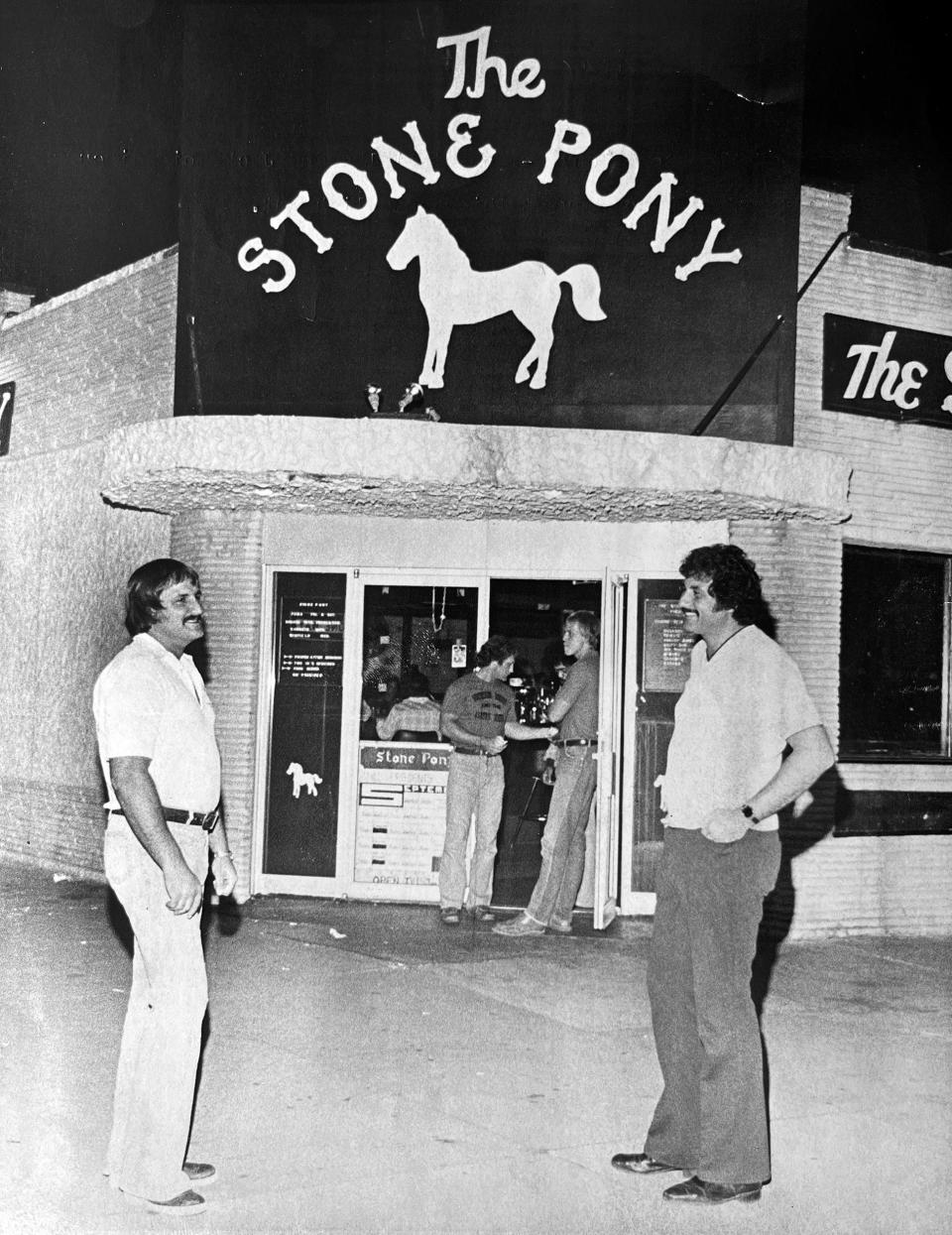
Things started out modestly enough. Jack Roig, who grew up in the Washington Heights section of New York City, was working in computers, and as a floorman at the Rip Tide Bar in Point Pleasant Beach. He wanted to open his own place.
A real estate agent showed him the then-closed Magic Touch at 913 Ocean Ave., next to Mrs. Jay’s Beer Garden at the time.
“I told him first off, I know Asbury’s a sewer so I don't want to go the Asbury,” Roig said.
In 1974, Asbury Park was in the midst of a decades-long economic downturn that saw the deterioration of the city, including the waterfront and downtown. The scene became so bad that even the beaches would be empty on hot summer days. The agent didn’t have the keys for 913 Ocean.
“The front doors were all painted black and each one had a circle in it,” Roig said. “I looked at the door and said 'OK, I’ll buy it.' I didn’t have the money. I had to borrow all of it. I was lucky and stupid, not necessarily in that order.”
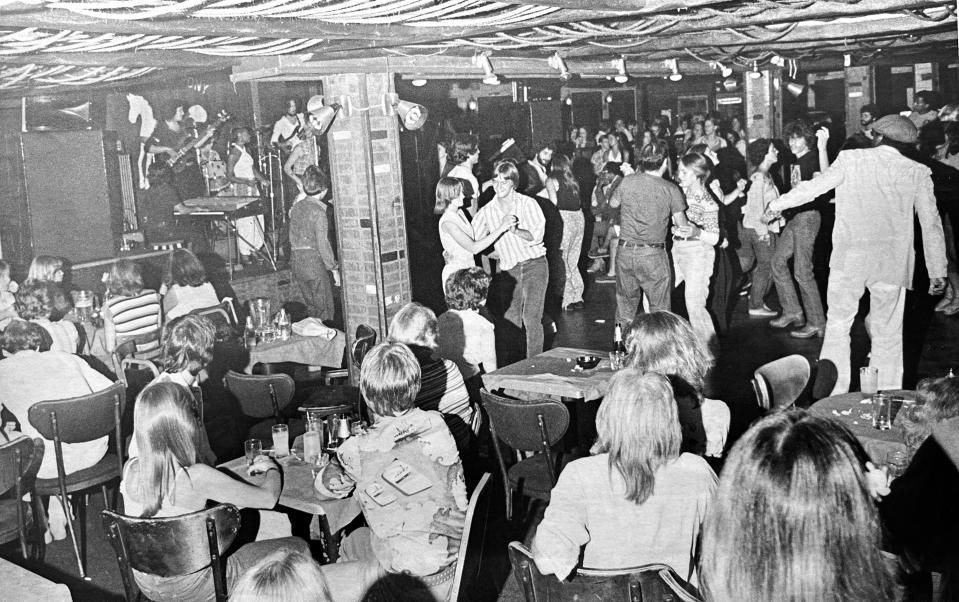
The Stone Pony was about to ride. But first, the Stone Pony had to become the “Stone Pony.”
Roig's inspiration for the name came from a night of romance.
“I woke up with a young lady in a shirt with little horses,” Roig said.
The first night it opened, It snowed and one customer came. After that, things went pretty well going into the summer of ’74. Roig brought the crew of the Rip Tide Bar, which had closed, to the Pony — and the clientele followed.
Some of the area’s funk bands hit the stage.
“It was an interracial scene, Black kids and white kids, digging this and dancing to deejays spinning funk mixed with some Top 40,” said Tony Pallagrosi of Lavellette. “Really killer funk bands with horn sections, and I was really drawn to that.”
Southside Johnny and the Asbury Jukes
A city band with a killer horn section, the Blackberry Booze Band, came through playing horn-fueled R&B and soul music. They would soon become Southside Johnny and the Asbury Jukes.
“The Pony was a place where people would come and dance and feel relaxed and it was just set up perfectly for us,” said Southside Johnny Lyon, a native of Ocean Grove. “I guess it felt comfortable for the audience, and it was comfortable to us — it made us in a way. The Stone Pony was set up for bands to play.”
The stage, like today located right at the entrance of the club as you walk in, was big enough to accommodate the Asbury Jukes horn section.
“We were terrible at first, but the music we were trying to play was great stuff,” the late Jukes keyboard player Kevin Kavanaugh told the Asbury Park Press in 2000. “We got good, just from playing so much. We helped to create the Pony's identity with all that soul stuff and old blues.”
In an era when rock music was pointing toward progressive rock, singer-songwriters and theatrical rock, Southside Johnny and the Asbury Jukes, with Little Steven Van Zandt as the musical director, drew their inspiration from mid-’60s rock and soul, which was not the hot thing at the time.
“We were completely against what was fashionable and trendy, and the only sort of saving grace for us is you had to be a dance band in the bars, and that included ’60s soul music,” Van Zandt said previously about the era. “Even then, before disco took over, it was still the best dance music.”
Unlike today, fans danced to the live music at the Stone Pony in the ’70s.
“Johnny was the voice but Steven, that was the sound in his head,” said Pallagrosi, who had joined the Jukes on trumpet. “The horn section wasn’t the way Chicago used horns. It wasn’t used the way Blood, Sweat and Tears used horns, and it wasn’t the way Stax and Motown used horns because we were more than a horn section. We played the horn parts, we basically played the string parts, and we played the organ parts all at the same time. So we played constantly. The horn sound was really unique, and it was a bitch being a trumpet player and playing that much.”
The Jukes were making history, and, like the song says, having a party while doing it.
“You never knew what was going to happen night after night,” Lyon said. “The Hells Angels, the Pagans or one of the motorcycle clubs was going to come and beat us all up, or a guy with a shotgun or the fire inspector would come in say it’s too crowded and then all of a sudden he would leave with a wad of cash or something like that. It was quite an adventure.”
Multiple band members wore cologne on a part of their bodies, let’s say, not usually associated with cologne. The action on stage, and off, was hot.
“The Rolling Stones — that to me was what I wanted,” Pallagrosi said. “I wanted that lifestyle and suddenly it was there. It was like, 'Wow, how did that happen.’ ”
A night of discord
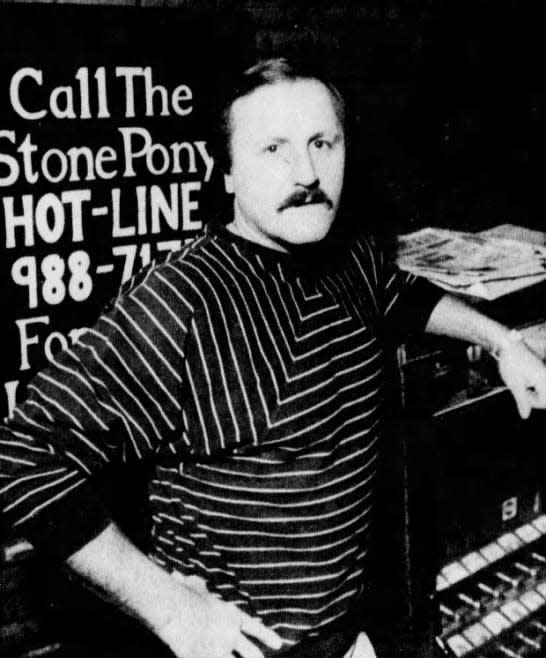
The Pony scene went national on Memorial Day, May 30, 1976, when the album-release show on stage for the Jukes' “I Don’t Want to Go Home” at the venue was broadcast across the country, including on the big Philly rock station WMMR-FM.
“That was the turning point where people got to know you outside the southern Monmouth County area,” Roig said. “It was a big night for Johnny and the Jukes, and a big night for us. It was a fun night.”
About three years after opening the Pony, Roig entered into a business relationship with Robert “Butch” Pielka, who had been managing the club.
“He got a percentage of the place — he earned it,” Roig said.
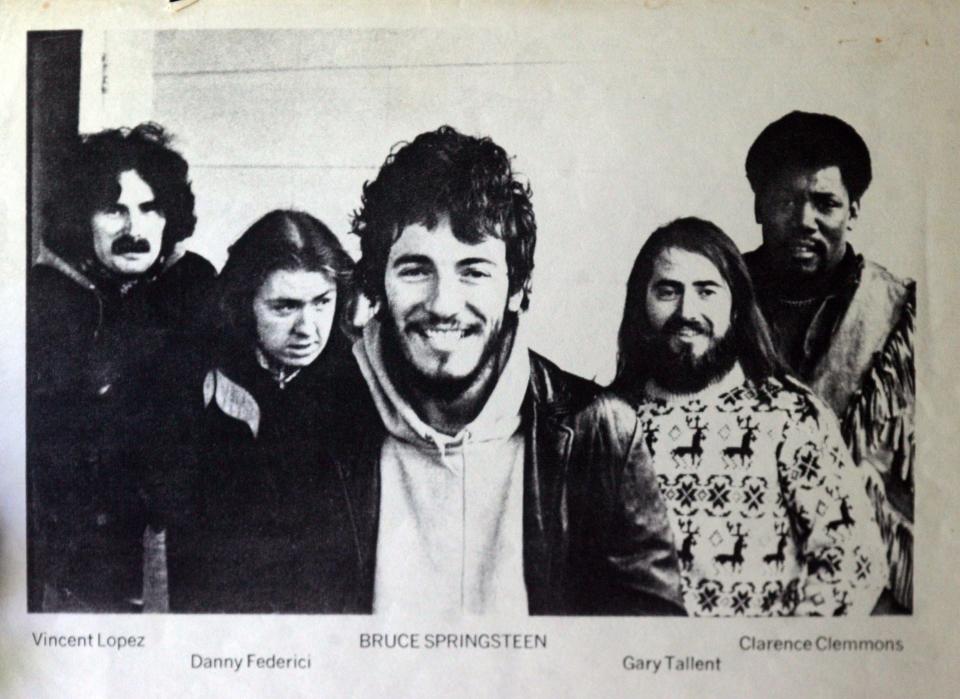
It wasn't always an easy place to manage. In late 1977, there was a night of discord when E Street Band member Danny Federici was thrown out by Roig and the Pony staff.
Federici was hiding out in the bathroom, doing lines of cocaine.
“I told him that night, 'Danny, if you really have to hide, I can hide you in my office,” Roig said. “It was later on that night he put out a whole pile of blow on a table on the dance floor. I went over and I blew it off the table. Two of the floormen picked him up.”
The bouncers escorted him out of the club and put him down on the sidewalk, Roig said.
“Nobody touched him,” Roig said. “He called up Clarence (Clemons), and Clarence came down saying he was going to kill whoever beat up Danny. Clarence and I talked about it out in the street quite a while and he finally realized what happened and that’s what happened. I’m glad Danny finally straightened himself out and he got all better.”
Hello, Bruce Springsteen
A common misconception about the Stone Pony is that Springsteen got his start at the club.
“Anybody says that, I correct it,” Roig said. “He had two albums out before he walked in the front door.”
Yet his regular attendance at the club made it the landmark it is today.
“Bruce was the catalyst for where we went,” Roig said.
Springsteen became scarce at the Pony for about five years following the Federici incident. He came back strong in the summer of 1982 with 11 appearances at the club, playing Sunday nights with Cats on a Smooth Surface.
The Boss' summer blitz added to the magic of the club.
“The excitement level went beyond the roof,” said Lynne Kirchdoerffer of Long Branch. “He was still our little secret here at the Jersey Shore, even though he was out a lot. Everybody was respectful of him to the point where on some nights no one talked to him. He would be with some of his friends, but you didn’t want to bug him because you didn’t want him to leave.”
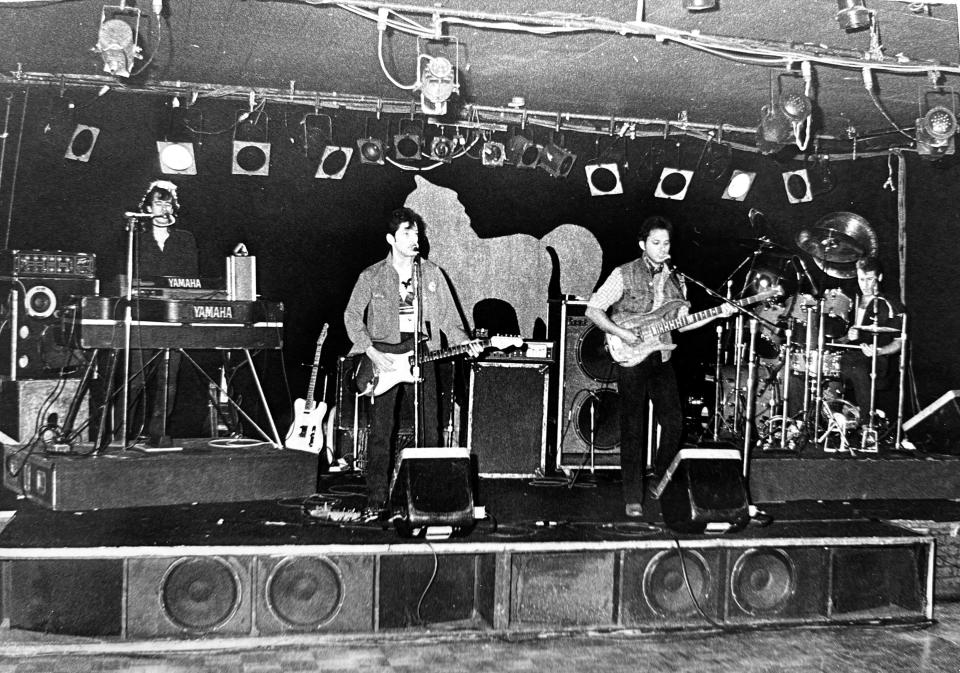
Kirchdoerffer kept notes on Springsteen's appearances at the Pony, and other venues during the era, including at the former Big Man’s West, owned by Clemons, in Red Bank.
“They would also have joke nights on Sunday nights, and he would get up and tell jokes,” Kirchdoerffer said. “I remember one Easter he got up there and told that Easter Bunny joke that he’s told before. We were young and out all the time and music fans, and here you have Bruce Springsteen playing in your local bar once a week.”
Springsteen’s fame blasted into another stratosphere with the hit 1984 album “Born in the U.S.A.” The Boss and the E Street Band began their tour with a rehearsal show June 8 that year at the Stone Pony, which included the first-ever live performances of “Glory Days,” “Darlington County,” “My Hometown” and “Born in the U.S.A.”
The Boss was still a regular through much of the decade — 1987 was a particularly active year. But in 1988, Springsteen moved to Los Angeles. The run for Roig and Pielka came to a close in 1991, as alternative rock ascended and the city's Fast Lane and the Green Parrot in Neptune landed the up-and coming national rock bands. Other issues arose.
“One year they told us our liquor liability (insurance) was going to be $185,000,” Roig said. “Who can afford that? So then the (alcohol-related) lawsuits came and that’s when you went down.”
Changes on Ocean Avenue
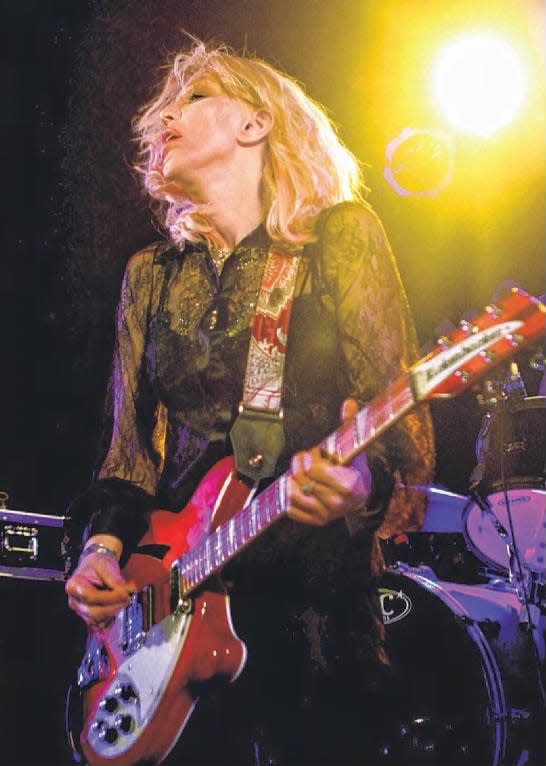
Local businessman Steven Nasar purchased the club soon afterward. Pallagrosi, by then one of the club’s music promoters, booked the alt-rock duo Carter the Unstoppable Sex Machine to play the re-opening night.
It was a break with the past.
“The audience that liked alternative rock, and punk rock and hardcore and skater rock, all of that stuff from the Bosstones to the Deftones to Reel Big Fish to the Catherine Wheel to Blur to Blind Melon, they liked Asbury Park. They kind of adopted it,” Pallagrosi said. “They made it their own. It wasn’t a bunch of uptight suburbanites cramping their style in Asbury Park. That’s what allowed us to do the (punk rock-themed traveling) Warped Tour.”
The Asbury Park oceanfront landscape in the mid-’90s was barren and blighted, and the beaches were still empty on sunny summer days. But thousands would come down to the city on Warped Tour days, and the fans would fill the Stone Pony as well.
“I’ll never forget having to bribe guys for the use of their parking lots,” Warped Tour founder Kevin Lyman said previously. “I remember the half-finished buildings dotting the Asbury Park landscape, but it’s all different there now.”
The New Brunswick punk-rock group Bouncing Souls relocated from Hub City to Asbury Park and made their Stone Pony shows, including the annual Stoked for the Summer festival, community events.
“The Boardwalk really was like a ‘Scooby-Doo’ ghost town,” Bouncing Souls member Greg Attonito previously said. “It was like broken-down rides and just a place that was just neglected. And we loved it. It was just like a place to hang out and just be like, ‘This is dangerous.’ It was kind of exciting. You’d go surfing and not know what was going to happen to your car, that kind of deal.”
Take it outside
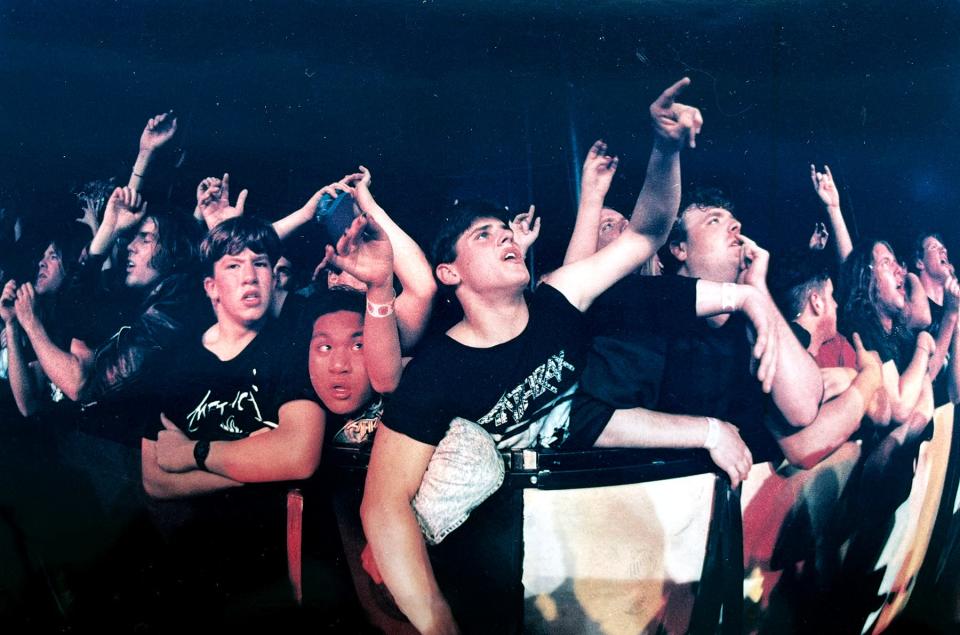
A major addition was made to the Pony experience in 1992.
“When Mrs. Jay’s got knocked down, that’s when we got the idea of putting up a circus tent and creating the Stone Pony Big Top,” Pallagrosi said.
The Stone Pony Big Top, precursor to the Stone Pony Summer Stage, allowed the venue to host bigger acts, like Courtney Love and Hole, Blind Melon and Live on an outdoor stage adjacent to the club.
“After two and a half years the town said, how long has this thing been up? ‘The last two and half years,’ ” Pallagrosi said. “What do you mean? This is supposed to be an impermanent structure. You're supposed to take this up and down. We were like, ‘Oh well, glad you’re telling us now.’ They never said anything until two and half years later. Then we heard a storm was coming. Oh, really, OK. A nor'easter? OK, so we just watched it get blown down.”
Running a live music club in the city, especially on the all-but-desolate waterfront, during the period was a struggle. The Stone Pony became Vinyl, a dance club, in 1998. But it was short-lived, and closed soon after.
The comeback saddles up
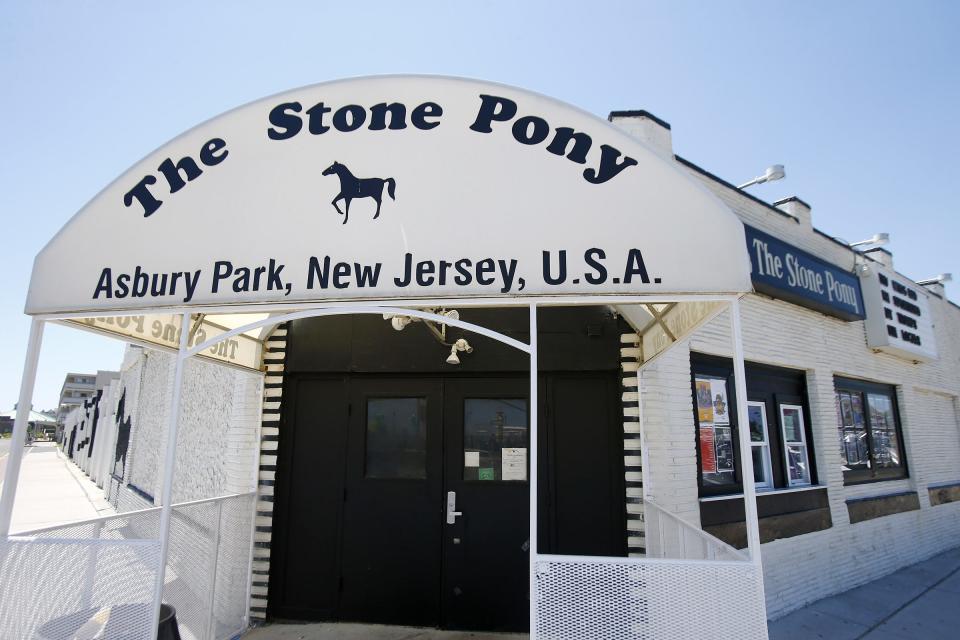
By 2000, there were stirrings of a city revival in Asbury Park. Visual artists were starting to set up shop in downtown storefronts, the gay community had been moving in, and Madonna producer Shep Pettibone had rechristened the nightclub inside the Empress hotel, a block away from the Pony, as Paradise.
Domenic Santana, owner of the Hard Grove Cafe in Jersey City, bought the Pony with a group of partners. He redesigned its interior to harken back to the club’s — and the city’s — glory days, with Asbury Park memorabilia and a checkered floor. Outside, he bought a stage from former Springsteen manager Carl "Tinker" West to commence the Pony's modern Summer Stage era.
Gov. Christine Todd Whitman attended the re-opening weekend party.
“On opening day you had 13 satellite trucks, live from Asbury Park,” Santana previously said. “When I saw that I said, ‘Bases loaded, we got to hit it out of the park!’ I was well rehearsed. I knew that I didn’t have a second chance.”
A waterfront redevelopment plan called for the demolition of the Pony. A grassroots movement emerged to push back, and Santana rode a white horse down Ocean Avenue to protest. Santana sold the club to Asbury Partners after the city’s adoption of a waterfront master plan that made it financially unfeasible to keep the club, he said.
The club has been operated by Madison Marquette since 2008, and its redevelopment is no longer part of the waterfront master plan.
General manager Caroline O'Toole came on board in 2003.
“In the beginning it was difficult because Asbury was not yet developed and Madison Marquette wasn’t here and it was a tough go for five years, a really tough go,” O'Toole said. “During that time I didn’t know if the Stone Pony would still be able to stay here.”
O'Toole credits Madison Marquette for making a commitment to the Stone Pony and the city's oceanfront boardwalk starting in 2008.
“Other boardwalk developers had come through and it never worked out but Madison came though,” O’Toole said. “Gary Mattola, who’s with Madison, said just when the real estate market tanked, ‘Let’s go, let’s do this.’ ”
Superstorm Sandy brought the sand and waves from the beach to the Pony’s door in 2012, and COVID-19 closed the club, as well as the state’s other music venues, for months in 2020.
“After COVID, the Jersey Shore became even busier because during COVID it became a place where people were comfortable, and maybe they experienced it for the first time and saw how great it is,” O'Toole said. “Now they come back on a yearly basis.”
Bands, both national and locals, treat shows at the Pony with reverence. The hip-hop duo Eric B and Rakim made their Pony debut last summer, decades after becoming hitmakers.
“The Stone Pony for us is the girlfriend that got away,” Eric B previously said. “We played every historic building worldwide, from Hammersmith Odeon (in London) to the Apollo, to Madison Square Garden, to all the other buildings that have been torn down. The Stone Pony is the girlfriend in high school who got away. We’re going to have a great time.”
Gov. Phil Murphy introduced the duo at the Pony show, which was part of the new North to Shore Festival, which debuted 2023 with music, film, art, comedy and more in Asbury Park, Newark and Atlantic City.
What's the future of the club?
Madison Marquette has had a checkered record when it comes to the operation of the city’s other historic entertainment venues. The Paramount Theatre and Convention Hall have been dark since August 2021, when the city issued a notice of default to the company over safety concerns and structural concerns over Convention Hall.
Madison Marquette previously shut the Paramount and Convention Hall down in 2013 over a dispute with the city about the operation of waterfront parking, and they had oversight of the former Casino as that venue disintegrated into disrepair and was eventually demolished.
In recent weeks, Madison Marquette has sold its management, marketing and leasing business to Avison Young, a Toronto-based commercial real estate services company. A company spokesperson said the sale will not “result in any changes to Madison’s development plans, property management, or leadership for the Asbury Park Boardwalk.”
The company did not make an executive or spokesperson available for questions specifically regarding the future operation of the Stone Pony, or to give an update on the company’s proposed summer concert stage at the site of the former Casino.
“Madison Marquette is in default (with the city),” said Quinn, Asbury Park's deputy mayor. “We worked together on this application (for the state’s Boardwalk Preservation Fund) to try to get Madison Marquette millions of dollars to make the repairs. My hope is that we can continue to get that type of working relationship, but it remains deeply concerning to me that the Casino and Convention Hall are falling into the water. I’m cautiously optimistic that the state provides funds so Convention Hall can be restored to its former glory."

Still, the future looks bright for Stone Pony, O'Toole said. Her team is looking to present more Summer Stage shows than ever before this summer, and more anniversary events are expected to be announced.
The Bruce Springsteen Archives and Center for American Music at Monmouth University is hosting “Celebrating the Stone Pony Anniversary: Spotlighting 50 Legendary Years of Music Memories” on Saturday, Feb. 10, at the club.
No question about it, the eyes and ears of music fans will be focused in on Asbury Park.
“It can be a rainy Monday and I can walk out the door and see somebody taking a picture of the front of the building,” O’Toole said. “There’s not one day that didn’t happen. I know that’s because of one, the history, and two, Bruce made us famous. To this day that lives on through generations.”
Fifty years later, Roig is no stranger to the Pony. He’s a regular at the venue in the summer.
“The one thing that I am really proud of is,” Roig said, “sooner or later the business will be gone, the building will be gone — but people will always remember the name.”
Subscribe to app.com for the latest on the New Jersey music scene.
Staff writer Michael Diamond contributed to this article. Chris Jordan, a Jersey Shore native, covers entertainment and features for the USA Today Network New Jersey. Contact him at @chrisfhjordan; cjordan@app.com
This article originally appeared on Asbury Park Press: Stone Pony in Asbury Park celebrates 50th anniversary

